Lois Heckman
Repairing What Is Broken
Nothing brings people together more than these three things: birth, death and weddings.
In many ways all three are life-affirming, which may seem counter-intuitive for death – but funerals, being truly for the living, find people gathering who may not usually associate with one another.
Everyone, regardless of their beliefs, celebrates a birth in the family or community.
And of course – weddings. No matter how unlikely a couple may seem, if perhaps coming from different backgrounds or traditions, we gather for the ceremony and celebration to mark their commitment to one another and celebrate love, partnership and the possibilities of the future.
In these turbulent times it is good to remember that there are important things we do share. These three life milestones are certainly some of them. We all have more in common than what seems to divide us. We all want safety, security, and to be loved.
My calling as a Humanist Celebrant helps me bring families together for just those reasons. A meaningful and honest ceremony can address the things we too often leave unspoken. We can heal.
I recently officiated a ceremony for a couple who were focused in their relationship on the Japanese concept ‘Kintsugi’ which means Golden Rejoining.
In literal practice it is the art of repairing broken pottery by mending the cracks or breaks using a special gold material to repair it. Rather than trying to hide the flaws, it highlights them, because in life sometimes the repairing is what matters the most. And herein lies the philosophy. We often focus on what is broken in our lives and relationships, and our world - but we need to focus on how to repair it. And we cannot see clearly what is wrong until we open up the wound (break it open) to understand how to fix it.
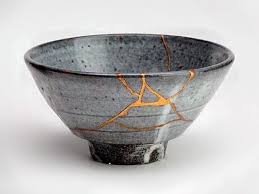
Judaism has a similar philosophy – that of ‘Tikkum olam’ – which means ‘repair the world.’ This form of repair is done by acts of social responsibility. In fact, many religions and philosophies teach similar concepts.
I wonder if we can repair the breaks in our society. How would that work? All I can do now is help in small ways, for those who come my way, looking for a service that celebrates the whole but might also repair what is broken.
What do non-denominational, secular Humanism and spiritual mean?
Dogs and Weddings … a few things to know!
If you’re a dog person and you’re planning a wedding, I’ll bet you’ve thought about having your pup or pups involved. So many dog-loving couples think about their fur baby walking down the aisle. But can it happen? Maybe. Before you take that leap there are several obstacles to consider. Read on!
To state the obvious: first and foremost is the well-being of your dog. Is the task a good fit for your (certainly perfect) pet? A jumping dog, a nervous dog, or a senior dog probably won’t work well, especially if you expect a little interaction with your guests. You need a well-trained, socialized dog to participate in your wedding. On the flip side, an overly friendly dog (like my Louie) might jump on someone, or just disrupt the proceedings.
And before you fall further in love with the idea, check with your venue to see if dogs are allowed on the property. Be prepared to ask and answer a few questions.
Will your dog will be allowed to stay with you if there is on-site accommodations?
Think about your time frame – will you have to leave her alone for too long when you go to your reception?
To facilitate this dream it is very helpful to have a designated handler for the dog.
The most popular task for a dog is the walk down the aisle, often as a ring bearer or flower dog, or just walk on in and be awesome. Here’s how it works: obviously, someone has to escort the pooch down the aisle – a flower girl or ring bearer, Jr Bridesmaid or Jr Groomsmen are great choices, but really anyone can fill the bill. Then, have your pup whisked away to the dog friendly pre-arranged location (or back home) after a nice walk and a cool drink of water, of course!
Having your dog stay throughout the ceremony could take the focus off of you! He had his moment, now it’s your turn. If you do want said dog to hang around for some post-ceremony photos, have her exit the ceremony site until it’s time for the photos or social interaction. Either way, your pup will probably leave before the reception. This is why the dog handler should not be a guest, but someone specifically designated and paid to do this important job. Yes, hiring someone gives it importance and accountability – so please consider that.
Including your dog in your photos is worthwhile. Engagement photos, wedding photos, or save-the dates, are all great opportunities for dogs to be their most adorable. The photos also provide a lifetime of memories.
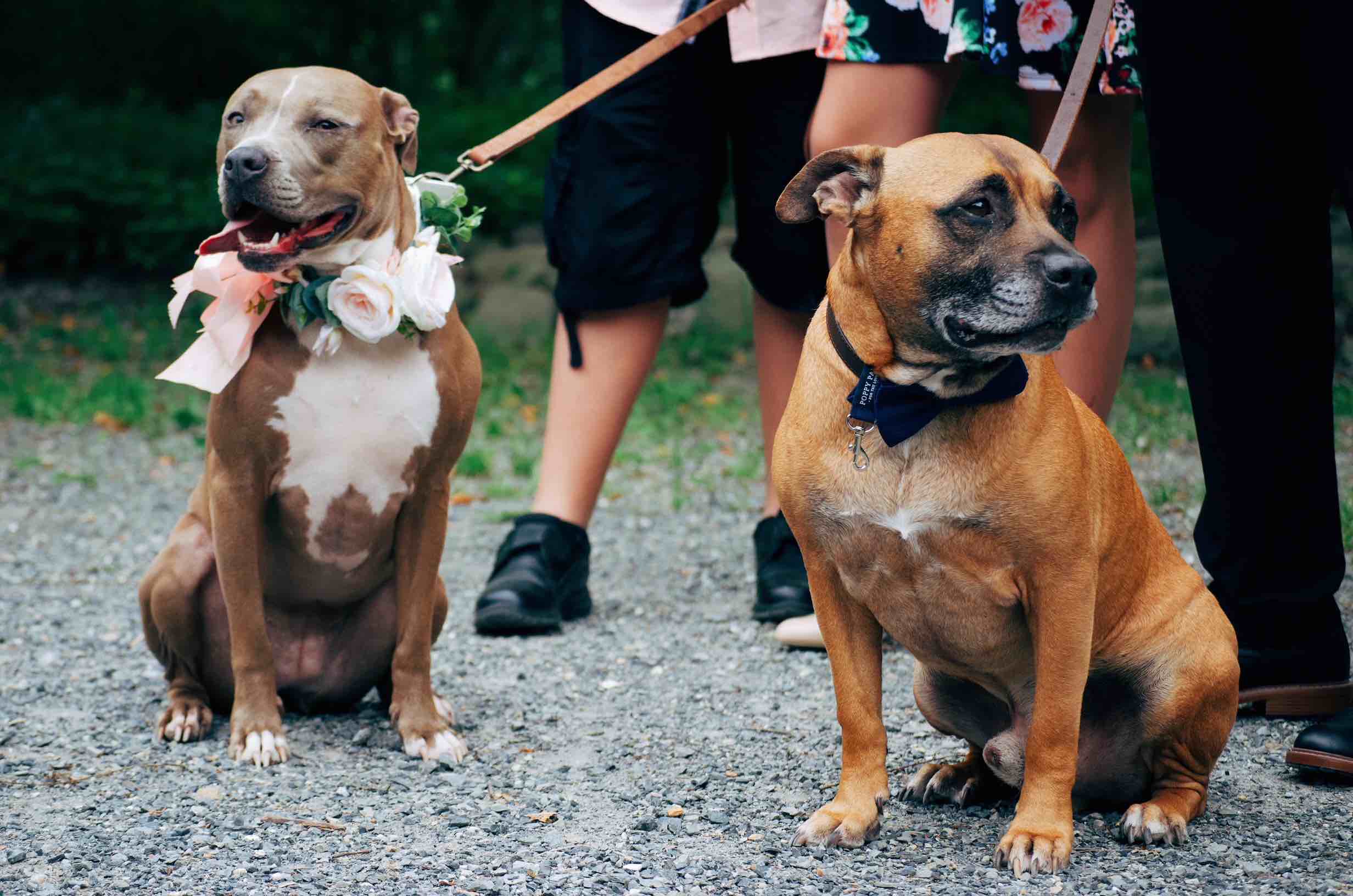
If you can’t arrange to have your dog with you at your wedding, consider including a few words about her in the ceremony, in the program book, or at the reception. How about using photos of your dogs incorporated into your table markers? (Side note: this is, in fact, probably the only way you could involve cats.) Take your pet’s photo, add a graphic, such as the table numbers, frame it, and place on the tables. Voilà!
How about a big cardboard cutout of your dog for photos or as photo-booth material?
You don’t have to dress up your dog, but some people do love that. Maybe just a special collar. You certainly want a freshly bathed and groomed dog for the big day. Schedule a spa day for your four legged friends as well as your two legged ones.
If you think this is all ridiculous, you’re probably not a dog person. And please give me a hand for not including all those silly dog puns! It was a ruff, ruff effort. It wasn’t too much of a fluff piece, was it? I gave you the real poop! Vow wow wow! It was pawsitively off the leash!
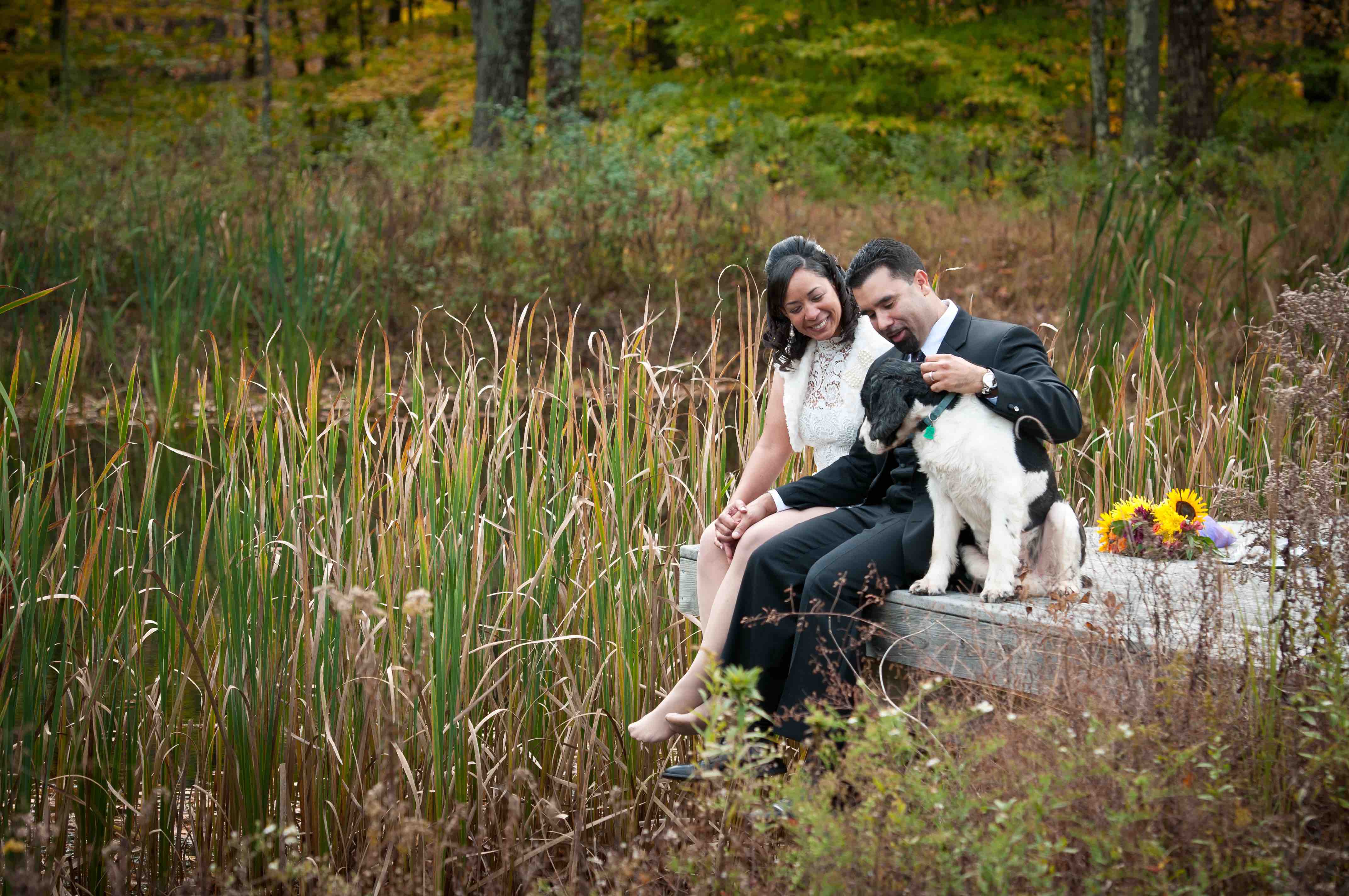
A Brief History of Marriage
Ceremony Matters - by Lois Heckman
There is no country, culture, religion or tradition that does not celebrate marriage. As I recount here a brief history of weddings I’ll confine it to our roots in Western civilization - I couldn’t possibly explore the entire planet, this topic is big enough already! Here are some highlights.
The earliest evidence of weddings is found to be about 4,350 years ago. Anthropologists believe that before that families were loose groups of people, about 30, with several leaders and shared partners. There is evidence showing a marriage ceremony from about 2350 BC in Mesopotamia. It spread from there, being embraced by the ancient Hebrews, Greeks and Romans.
The earliest examples of wedding rings are from ancient Egypt. This tradition, traced back to those ancient Romans and Greeks, was adopted by Christians in Europe in the Middle Ages. The rings were braided or woven out of reeds or leather, but the rich and powerful had beautiful metal rings. We know this because they have been unearthed, often made of gold and jewels and can be seen in many museums.

Tossing rice and carrying bouquets have clear meaning. Because growing food and producing children was central to survival, rituals involving grains developed. You can be sure anything involving grain was used to petition the gods for successful crops and births. Bouquets, made of various herbs, were thought to promote fertility. But the fragrant bouquet was also supposed to ward off evil spirits, and cover the smell of the unwashed. Today fragrant flowers are still used, so take a deep breath and toss the rice!
Contrary to what we see in the movies and television, ancient unions had little or nothing to do with love, or even religion. It was a way to guarantee that the man’s children were his, biologically, and thus his property, and his children were his work force. Marriage also had to do with the alliances of families – bringing powerful dynasties and countries together.
Monogamy is seen as central to marriage, but historically polygamy was very common, especially in Biblical times. Men with high status could afford many wives, but most had just one. That makes sense because otherwise there wouldn’t be enough women to go around. Monogamy became the standard somewhere between the sixth and ninth centuries, as the kings and nobility battled it out on this principle with Catholic Church. Guess who won?
Speaking of the church, the next big step in the history of marriage was the rise of Roman Catholicism in Europe. By the eighth century marriage became a church sacrament. In 1563 it was written into canon law.
In an interesting contrast, ancient Judaism also negotiated marriage for alliances and property, but women did have some rights and could actually even get a divorce. The Ketubah, a marriage agreement, spelled out those rights, and is still used today. The belief that men ‘owned’ their wives persisted for centuries in almost every religious sect. Only about 250 years ago did the idea of love in marriage gain traction.
Most of our modern traditions begin with the Elizabethan era. Between 1558 and 1603 marriages were mostly still arranged and women could consent at age 12, and men at 14, but some of the customs we are familiar with began then, including the bridesmaids and groomsmen, the processional, a religious officiant, and an extravagant feast.
During our Colonial times marriage licenses appeared, invitations were sent, and the ceremony now took place in the home where a minister presided, and a nice party followed.
The Victorian area (1800’s) brought us the famous white wedding dress, along with veils and flowers, and back to church for the ceremony. A small dinner followed the ceremony, and a larger breakfast party the following day.
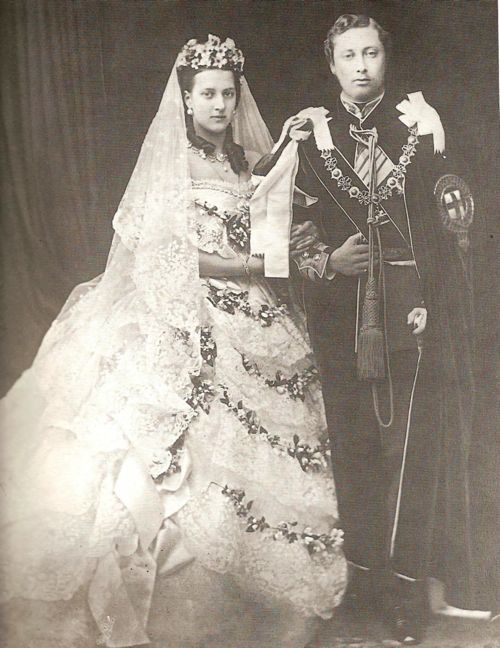
The modern wedding as we know it today really took its form after World War II. In an era of prosperity and peace, impressing your friends became important not only for the rich, but for the growing new middle class. A crucial influence was the new mass communication - newspapers and magazines, and eventually television - so that modern couples developed a shared vision of what a wedding should look like, or at least what they were told it should look like.
Efforts to legalize same-sex marriage began across our country in the 1990s, and with it challenges on the state and national levels. Civil unions for same-sex couples existed in many states but created a separate but equal standard. Massachusetts became the first state to legalize same-sex marriage with many states to follow. It became obvious that if a couple could be married in one state but not carry those rights in another state something needed to be done. On June 26, 2015, the Supreme Court decision in Obergefell v. Hodges made marriage equality the law of the land giving same-sex couples in all 50 states the right to full, equal recognition under the law.
What exactly is eloping and why do it?
Over the years I have officiated many elopements. There are so many reasons a couple choses to elope. But, first, what is elopement?
Originally elopement meant sneaking away to get married without the parents knowing. It was secretive and hurried. There might also be a pregnancy involved. Years back, it didn’t have the best connotation. But not so today! Sometimes the term ‘elopement’ is used when there are a handful of guests. In Pennsylvania no witnesses are required for our marriage license – so just the couple alone can do this legally! But maybe you want 10, 20 or 30 guests? Whether you call it elopement, micro-wedding, tiny wedding or minimony, having a small guest list can be exactly right for some couples.
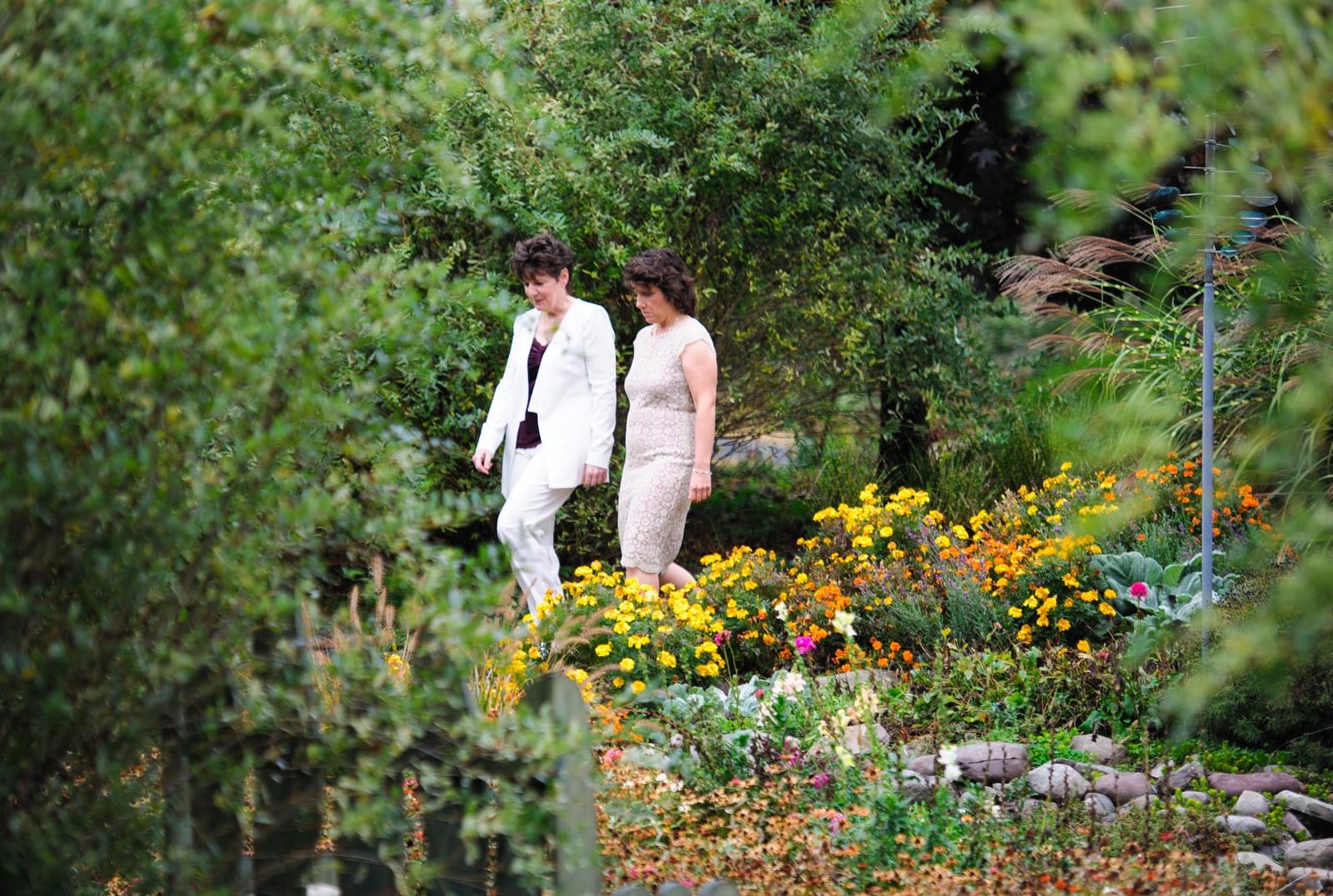
One good reason to elope is to avoid conflict. Family can be complicated. I recall one couple who had planned a nice backyard wedding at their home for their families and friends. It was a second marriage for both, and each one had several children. One day I received a call from them, asking if they could just come to my garden, just the two of them, and get married. Of course, you know I did just that. The drama had just become too much! Later, they told me, they would have some sort of party to celebrate – but eliminating the wedding formalities - the ‘who would stand where,’ the ‘who would have the rings’ and ‘who would walk with whom,’ and so much more… it was a relief to let all that go. Sometimes adding ‘wedding’ to ‘party’ makes people go crazy. Elopement does alleviate a lot of stress.
Another important reason to elope is the expense. If you cannot afford a lavish wedding you probably shouldn’t have one. Starting a marriage in debt isn’t the best idea. Or maybe you can afford it, but you choose to use that money for something else – like the honeymoon trip of a lifetime, or a down payment on a home, or paying off those student loands.
An elopement can be a romantic adventure and honeymoon rolled into one. I have friends who eloped in Mexico and had a blast.
I have my own little ceremony garden (Harmony Gardens) here in the Poconos, and lots of couples come to elope here. I provide them with ideas for places to stay and things to do, and they can create a mini-get-away. Other couples just wanted to keep it really simple, and I officiate a lovely little low-key ceremony and off they go! Nothing fancy, but still meaningful.
When you elope, you get to do so in your own style. Some women choose to wear a wedding gown, but others do not. You can be as casual or formal as you wish. There is no reason why you can't have all the glamour: the dress, the flowers, the rings – just without the guests! Some of the couples I’ve married stay at one of the several beautiful local resorts – places where other couples have large weddings. These ‘elopers’ enjoy the same amenities, from the hot-tubs and spa treatments to gorgeous rooms and lovely meals, keeping it all for themselves.
On the other hand, something fun, funky or casual is fine as well. Elope wearing jeans if you want to. Just keeping it simple is a real motivation for elopement, especially if you are more laid-back, or even shy. If you don’t enjoy people making a fuss over you or being the center of attention, a wedding can certainly create anxiety.
Planned elopements sometimes evolve into small weddings. This is not unusual. I get calls from couples who wonder if it would be ok to have a few people attend after all. You know the answer is yes! Somehow they realize they just don’t feel right depriving their parents or other important people the opportunity to be a part of this important milestone. Or the family finds out. Uh-oh!
An example that comes to mind: two brides who, intending to be secretive, let it slip and when their friends found out they were getting married they jokingly threatened to hide in the woods to watch the ceremony, if they couldn’t officially be there. The couple relented and with eight guests, everything turned out great.
I encourage everyone to find the appropriate way to tie-the-knot. It’s your wedding and your marriage and your life. You need not force yourself into something that simply isn’t for you, and eloping could be the right choice.
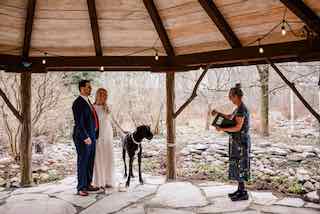
What exactly is eloping and why do it?
Over the years I have officiated many elopements. There are so many reasons a couple choses to elope. But, first, what is elopement?
Originally elopement meant sneaking away to get married without the parents knowing. It was secretive and hurried. There might also be a pregnancy involved. Years back, it didn’t have the best connotation. But not so today! Sometimes the term ‘elopement’ is used when there are a handful of guests. In Pennsylvania no witnesses are required for our marriage license – so just the couple alone can do this legally! But maybe you want 10, 20 or 30 guests? Whether you call it elopement, micro-wedding, tiny wedding or minimony, having a small guest list can be exactly right for some couples.

One good reason to elope is to avoid conflict. Family can be complicated. I recall one couple who had planned a nice backyard wedding at their home for their families and friends. It was a second marriage for both, and each one had several children. One day I received a call from them, asking if they could just come to my garden, just the two of them, and get married. Of course, you know I did just that. The drama had just become too much! Later, they told me, they would have some sort of party to celebrate – but eliminating the wedding formalities - the ‘who would stand where,’ the ‘who would have the rings’ and ‘who would walk with whom,’ and so much more… it was a relief to let all that go. Sometimes adding ‘wedding’ to ‘party’ makes people go crazy. Elopement does alleviate a lot of stress.
Another important reason to elope is the expense. If you cannot afford a lavish wedding you probably shouldn’t have one. Starting a marriage in debt isn’t the best idea. Or maybe you can afford it, but you choose to use that money for something else – like the honeymoon trip of a lifetime, or a down payment on a home, or paying off those student loands.
An elopement can be a romantic adventure and honeymoon rolled into one. I have friends who eloped in Mexico and had a blast.
I have my own little ceremony garden (Harmony Gardens) here in the Poconos, and lots of couples come to elope here. I provide them with ideas for places to stay and things to do, and they can create a mini-get-away. Other couples just wanted to keep it really simple, and I officiate a lovely little low-key ceremony and off they go! Nothing fancy, but still meaningful.
When you elope, you get to do so in your own style. Some women choose to wear a wedding gown, but others do not. You can be as casual or formal as you wish. There is no reason why you can't have all the glamour: the dress, the flowers, the rings – just without the guests! Some of the couples I’ve married stay at one of the several beautiful local resorts – places where other couples have large weddings. These ‘elopers’ enjoy the same amenities, from the hot-tubs and spa treatments to gorgeous rooms and lovely meals, keeping it all for themselves.
On the other hand, something fun, funky or casual is fine as well. Elope wearing jeans if you want to. Just keeping it simple is a real motivation for elopement, especially if you are more laid-back, or even shy. If you don’t enjoy people making a fuss over you or being the center of attention, a wedding can certainly create anxiety.
Planned elopements sometimes evolve into small weddings. This is not unusual. I get calls from couples who wonder if it would be ok to have a few people attend after all. You know the answer is yes! Somehow they realize they just don’t feel right depriving their parents or other important people the opportunity to be a part of this important milestone. Or the family finds out. Uh-oh!
An example that comes to mind: two brides who, intending to be secretive, let it slip and when their friends found out they were getting married they jokingly threatened to hide in the woods to watch the ceremony, if they couldn’t officially be there. The couple relented and with eight guests, everything turned out great.
I encourage everyone to find the appropriate way to tie-the-knot. It’s your wedding and your marriage and your life. You need not force yourself into something that simply isn’t for you, and eloping could be the right choice.

Personal traditions, rituals make funerals a reflection of the deceased
In a crisis it difficult to go your own way. People fall back to what they are familiar with which is often church. Choosing a celebrant for a funeral service is still rare. I want people to understand that there are different ways to come together in times of grief and pain, and that it is very important to do so. Perhaps the biggest value to any service is a sense of community and the loving support given by others.
As a Celebrant I not only officiate weddings, which are such joyous occasions, but I am called upon to officiate funerals. For simplicity I’ll use ‘funeral’ to include memorials and celebration of life services. I also perform baby welcoming’s or naming ceremonies, and other life milestones, by the way. But today I’m addressing the difficult funerals for younger people and even more so, specifically for suicide or accidental deaths.
My initial motivation in becoming a celebrant actually was funerals. When attending a funeral where the minister clearly knew nothing about the deceased, I was so upset and I knew there had to be a better way, especially for non-religious people. So off I went to study and become a celebrant.
Let me share some of my experiences in creating and performing non-religious funerals.
Most important for the most extreme and painful situations is to acknowledge the elephant in the room. I believe honesty is important and everyone is thinking about the cause of death anyway, so let’s get that out there. So after a welcome and introducing myself I dive in. I want to speak to how survivors are feeling. I know they feel guilty and helpless as well as angry or confused.
Speaking to our grief I have found these words from Ashley Davis Bush helpful:
“Grieving is not a short-term process; it's not even a long-term process; it's a lifelong process. 'Having a future' now means that although your life will flow again, it will flow differently as a result of the loss. Your grief will become incorporated into your life history, become a part of your identity. And you will continue now, and forever, to redefine your relationship with your deceased loved one. Death doesn't end the relationship, it simply forges a new type of relationship - one based not on physical presence but on memory, spirit, and love.”
I might delve deeper into the tragedy of the death before moving on to remind us that we need not define the person by their death but celebrate their life. This transition sets up the rest of the service to remember the deceased fully, who they were, who they loved and who loved them, and their accomplishments, hopes and dreams. No one should be defined by their death.
Because I know the power of ritual – and so many things in any funeral are very ritualistic – I can incorporate additional, special actions – but only if they speak to the deceased interests or identity. I have used small stones – asking people to hold them through the service and at the end we might place them somewhere meaningful. Stones can be tossed into a body of the water to go their way, making waves that intersect just as our loved one touched so many in ways we may never fully know. Or stones can be placed in a container for keeping.
Candles can be very helpful when they represent the grief, love, courage, memories and other important feelings. The meaning of each candle is spoken then lit by a special loved one.
One time we broke a ceramic bowl to free the soul in a nod to a Southwest Native American tradition. Other rituals could include flowers, water, wine, or other symbolic tangible items. Responsive readings can be powerful. For my own father’s funeral we passed out little shots of gin and ‘goldfish’ crackers – his daily tradition, and toasted him to the tunes of Frank Sinatra singing “Fly Me To The Moon.” This was so many years ago but still unforgettable.
A funeral can be as interesting and diverse as the deceased and their loved ones. I’m thinking of a ceremony a Columcille – a local megalith parks with standing stones. We broke up the ceremony into sections, walking to different areas within the park. Walking quietly in itself is a powerful thing. Upon arriving at each ‘station’ we had different readings and actions. This and many other unique services I’ve provided have confirmed my choice to become a celebrant was the right one.
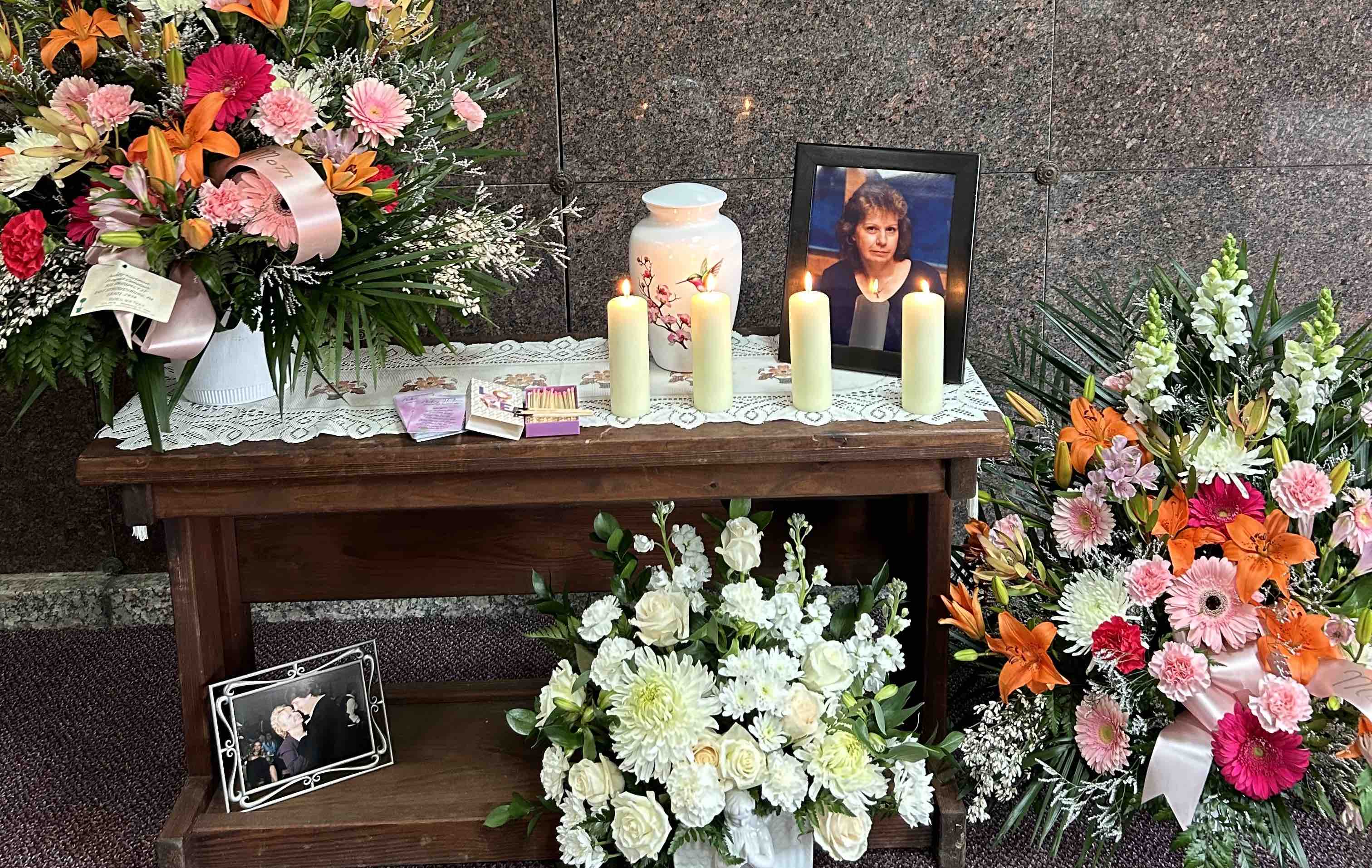
Exploring Spirituality
(as seen in the Pocono Record/USA Today Network)
Spiritual. This is how many people describe their beliefs. But what exactly does this mean? Literally, spiritual means ‘relating to things of the human spirit rather than material or physical things.’ But in a more religious context it can encompass a wide range of ideas.
For some it means they embrace the idea that there is more to life than what we see, while rejecting the dogma of organized religion. They feel a connection to something beyond themselves. They may call it the Divine, the Universe, the Sacred, God, or it might even remain nameless. And because spirituality can be an open-ended concept, it is not incompatible with religion or belief in God.
Gallup's 2022 Poll on Values and Beliefs finds 17% of Americans saying they do not believe in God, dipping to a new low. Other polling sources come out with similar results. But if you think everyone is honest when responding to polls, I have a nice bridge to sell you. These polls are how people self-report and I think many people are afraid to say they are not religious.
Additionally, Gallup did not offer the category ‘spiritual’ as an option. If they had, my guess is the numbers would have looked very different.
I have met with many couples who want to connect to their faith traditions, but in ways that are more compatible with a 21st century view of the world which includes science, evolved ideas on women, marriage equality and other contemporary issues.

You may recall that in 1600s Galileo came in conflict with the Catholic Church for proposing that the earth goes around the sun and not the other way around. This didn’t sit well, and he suffered greatly for his pursuit of knowledge. It’s a great example of what happens when dogma trumps progress. Ok, this isn’t the 17th century, yet modern ideas still often conflict with religious ideas, and you can find many examples of this right here right now in our country.
So how does one honor spiritual ideas and values in a wedding ceremony? There are as many ways to express it as there are different paths of spirituality itself.
Sometimes I simply make a statement of fact, saying that the couple share a sense of spirituality, and perhaps try to describe even using their words. For example, ‘they find peace and meaning in nature.’
Other times I include specific poems, excerpts or quotes from various sources that reflect their worldview. There is wisdom everywhere, and it doesn’t take long to find.

Some of my favorites sources are in poetry and literature, along with classics such as Rumi, Kahlil Gibran, Celtic writings, Lau Tzu, and Buddhist thought; but it is the couple themselves who will direct me to the right inspiration. The texts of Hinduism (the Vedas), and of course the Torah and the Bible all contain beautiful and meaningful words. There are scientists such as Neil DeGrasse Tyson. Carl Sagan, and naturalists such as John Muir, who have written eloquently about our place in the universe.
Beyond words, there are rituals that connect us to earth, air, water, fire, nature, culture, ethnicity, history, art and family. The possibilities are endless, and it’s always challenging and exciting to explore how we humans view our place in the world.
To me, being spiritual means putting great value on love and goodness in the world. What could be more beautiful than that?

Exploring Rituals for the Holiday Season
(as seen in the USA Today / Pocono Record)
With the holiday season upon us – I’m thinking of all the connections between our traditions, especially as expressed through ritual. What could be more ritualistic than Christmas, Hanukkah, Kwanzaa, Solstice, or New Year’s Eve? From the more secular parts of the celebrations, such as the Christmas tree and gift exchanging, to the most holy and sacred acts of worship, the holiday season is replete with customs, traditions and rituals. Lighting candles, decorating, wrapping gifts – all become meaningful when we do it year after year, just as our parents did, and their parents before them.
Sasha Sagan writes in her book For Small Creatures Such As We: “In every inhabited corner of the Earth, human beings have created rituals to give order and meaning to existence.” I agree completely!
Old or ancient customs connect us to the continuity of life, to our faith or cultural past. New traditions bring closeness within our own families and communities right here and now. It brings joy – more of the time. Sometimes those same traditions can become more of a chore.
Wouldn’t it be great to have your very own traditions to pass down through generations? Some families do, but if you don’t, you have the opportunity to start something of your very own. Simple things like driving around to look at lights, or baking cookies are holiday favorites. Here are a few more ideas that might inspire!
Explore world customs and make ornaments, food, or craft projects that reflect another culture. Can you imagine eating latkes for a special Christmas meal? Expand your cultural awareness with the Italian Fest of the Seven Fishes. You don’t have to be Latino to enjoy tostones (fried plantains) or a coquito, which is similar to eggnog with rum.
Giving is always important. Have your family conduct a food or coat drive, or buy gifts to donate to a local shelter. But before donating anything, be sure to check first to see exactly what they need. Remember, it’s not what you want to donate, it’s what they truly need. Gift cards are often perfect because they offer people the opportunity purchase what that actually need. Adopt any cause or charity that resonates for you, and then continue to support it every year.

Start a tradition of reading. Choose a classic such as the wonderful O. Henry story The Gift of the Magi, or try poems, chapter books, or just about anything. Perhaps pick something that takes you out of your comfort zone. Everyone will be more open to the book when it’s read together. Whether it’s after the candles are lit for each of the eight nights of Hanukkah, or for the 12 days of Christmas, read every night.
Sing songs together. Not everyone is musical but most can still muster up a few tunes with the family. Sing it loud, sing it proud, and sing it every year!
Start an on-line holiday remembrance tradition, using photos or video. Mix it up with quotes from the family and the famous. Include favorite foods, special moments and even a few bloopers (but not too many, don’t embarrass anyone).
These are just a few ideas that may inspire you. I hope you will dream up your own traditions and personal rituals to add depth and new traditions to your holiday season. Happy Holidays!
How to incorporate your values into your wedding ceremony
(to see the column in the paper - use this link)
With the holiday season upon us our thoughts turn to the charities and causes we wish to support. It is also a time many couples become engaged. These seemingly different things go together very well. How is that? Well, this may be a little controversial, but I feel it is important that your wedding expresses not only your love for one another, but your beliefs and ideals, those causes and issues that matter the most to you.
This can even include politics because they are completely interconnected. But is it ever appropriate to have a political statement as part of your wedding? Yes and no. It doesn’t have to be expressed in a ‘which-side-are-you-on’ kind of way. You certainly don’t want to alienate any guests. But it is simply a fact that government is responsible for upholding values you may hold dear. So many important rights are deeply tied to politics! Remember, inter-racial marriage wasn’t legal until 1976 (Loving v. Virginia). It was only in 2015 that LGBT couples could legally marry throughout our country. (Obergefell v. Hodges).
One key ingredient in marriage is commitment: the promise to be there through thick and thin, to have your partner’s back. When we make this promise it is based on many things and shared values are likely one of them. Here are few examples of the way I have incorporated this over the years.
For the Declaration of Intent – the “I do” part - where you are asked to agree out-loud to go forward with the marriage. For this part of the ceremony you could add to that something like: “And do you promise to strive for peace in your home, peace in your community and peace in the world?” Or “Do you promise to work together to make this world a better place?” Something along those lines.
Or consider including thoughts about your values in your wedding vows. Here’s just one example:
I, (NAME) choose you (NAME) as my husband/wife. I promise to be compassionate, tender and loving; to be attentive and supportive of you, and to be mindful of our words and actions. I promise to live our lives positively, with joy and humor and a commitment to our values. Through our love we will strive to make this world a better place. These things I give to you today, and all the days of our lives.
Another idea is to choose a unity ritual that reflects something that resonates for you. If the environment is important to you, you might want to use water as a symbol. Make it clear you are sharing the water to express your support for clean water for all who live on this earth. Or use rocks, or other natural elements in ritualistic ways, that reflect your care for the world. You can plant a tree.
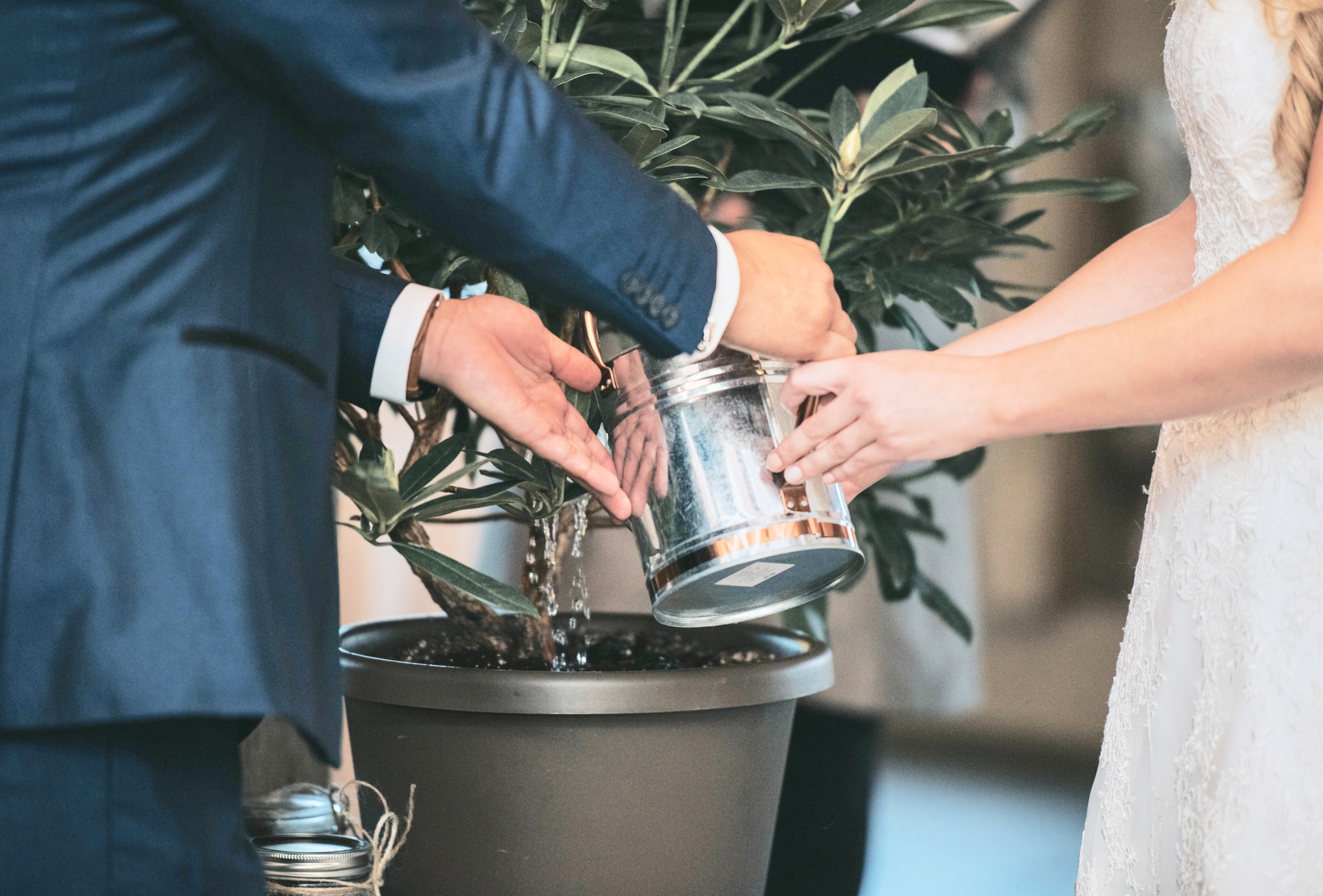
None of this is even possible if you don’t have an officiant open to these ideas. Celebrants such as myself have extensive training and know just how to create something special. Those copying ceremonies off the internet will not. Some religious leaders may balk at the idea and only want to use the prescribed liturgy. But if this is important to you, find a way to make it happen.
Obviously this isn’t going to be the dominant theme of your wedding, but slipping in a little about your worldview and convictions is a powerful thing.

Here’s an easy one. Instead of purchasing favors you can donate to a favorite cause. Be sure to let your guests know with a small note at their place setting. Let’s be honest, most people don’t really care too much about these little keepsake gifts anyway.
Finally, choosing vendors of diverse backgrounds and small businesses who support your values is another important way to express yourself. I hope this is something meaningful to think about